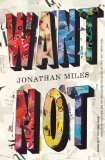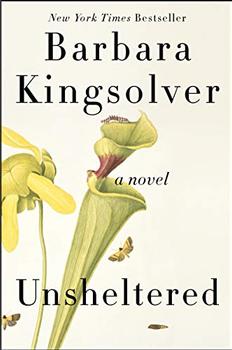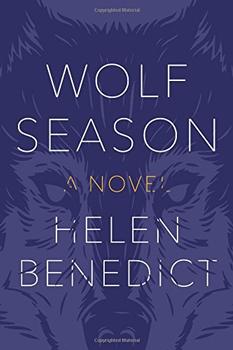Summary | Excerpt | Reviews | Beyond the book | Read-Alikes | Genres & Themes | Author Bio

Critics' Opinion:
Readers' Opinion:
First Published:
Nov 2013, 400 pages
Paperback:
May 2014, 400 pages
 Book Reviewed by:
Book Reviewed by:
Rebecca Foster
Buy This Book
"Waste not, want not" goes the aphorism, and Jonathan Miles's second novel explores both themes to their fullest extent: the concept of waste – from lives spent profligately to garbage and excrement – and ordinary people's conflicting desires. In three interlocking story lines, Miles looks for what is really of human value at a time when everything seems disposable and possessions both material and digital can exert a dispiriting tyranny.
As the novel opens in 2007, Thanksgiving finds New York City buried under an early snowstorm. The nation's annual excuse for gluttony makes a perfect metaphorical setting for Miles's exposé of food waste and consumerist excess. Even this time of feasting has a dark side, with Talmadge Bertrand, the first of three main characters, rummaging in trash bags outside Key Foods for edible pastries and produce. This scrounging lifestyle might be inevitable for local hobos and addicts, but it is a choice for him: he and his hippie girlfriend Micah are militant freegans, determined to opt out of the capitalist system by squatting and getting food and clothing free from what others throw away.
The second protagonist is Elwin Cross, Jr., an obese linguistics professor whose wife recently left him. Driving back to New Jersey after a drunken meal with a similarly heartbroken colleague, he hits a deer and, rather than waste all that meat, decides to take it home to butcher for Thanksgiving dinner. Processing the carcass and simultaneously getting rid of all traces of his ex-wife become twin obsessions for Elwin, as he advertises most of his belongings on Craigslist. "What do I do…with all this stuff?" he asks himself as he tackles his father's nursing home room – a question that takes on a more global significance when Elwin joins an interdisciplinary panel on nuclear waste management.
In the novel's third strand, readers meet Sara Tetwick Masoli, a 9/11 widow whose memories are embodied in stacks of possessions housed at "Lifesolutions 24-hour self-storage." Sara is now remarried to Dave, an odious debt collector whose raunchiness allows for a jokey relationship with his troubled stepdaughter, Alexis. For nearly seven years Sara has paid $59 a month to hold onto all these extra things that remind her of her deceased first husband; perhaps it is finally time to, as Elwin also attempts, break the tyranny of stuff.
Despite his gently satirical tone, Miles creates sympathy for even his more obnoxious characters through flashbacks filling in everyone's backstory. Micah appears less self-righteous once we learn about her childhood living in hyper-religious, backwoods Tennessee. Likewise, Elwin Sr. is not just an Alzheimer's sufferer but an illustrious professor of genocide studies who liberated a concentration camp. Even Dave, who is likely to disgust readers by photographing his Updikean perfect bowel movement (a scatological moment bringing in yet another connotation of "waste" for Miles to exploit), is still a three-dimensional character who struggles with feelings of emptiness and tries to suppress his lust for Alexis. Want not, indeed.
The disjuncture between what the characters desire and what they achieve is a continual source of irony. "You can't desire what's freakin impossible," Elwin's neighbor argues, to which Elwin replies, "Of course you can. That's all I ever do. That's all anyone does." Miles makes it clear that living in the modern world requires constant ethical compromises. All the characters, in their various ways, must find a balance between retreating from the world in frustration or despair, and engaging with the world hopefully. "We all got our wants," as a homeless man says to Dave, but the challenge is to find where those wants intersect with the common good.
A Yankees game provides a meeting point for the novel's three plot lines, though, admittedly, a somewhat tenuous one. Less important than these specific characters' interactions, however, is the thoroughness with which Miles exhibits myriad aspects of waste and want, both physical and psychological. His composite picture of modern New York is complete and convincing in itself, but also universal in its application. Never veering too close to polemic, Miles succeeds in revealing how meaningless modern lives of material and technological consumption can be: "How obscene and astonishing," Sara thinks, "that amidst all this digital plenty, there could still be nothing." On the other hand, he also counters the extreme anti-humanism of Elwin, Sr.'s theory of genocide, which posits that it has been an essential tool whereby civilizations limit population, thus minimizing conflict over resources. That way lies atrocity.
Want Not affirms the validity of human stories in spite of the seemingly overwhelming problem of wastefulness. What we waste, what we create accidentally, what we accumulate: these can all form a sort of physical legacy; "Historically speaking, we are what we bury," a colleague convinces Elwin. Yet like the text on the nuclear waste memorial that Elwin helps to design, this errant consumerism should stand as a warning to future generations: "NOTHING IS VALUED HERE...THE DANGER IS STILL PRESENT, IN YOUR TIME AS IN OURS." Like Miles's characters, readers must recognize that true value is based not in what we hoard or what we throw away, but in the ties we form in life.
![]() This review was originally published in The BookBrowse Review in January 2014, and has been updated for the
May 2014 edition.
Click here to go to this issue.
This review was originally published in The BookBrowse Review in January 2014, and has been updated for the
May 2014 edition.
Click here to go to this issue.

If you liked Want Not, try these:

by Barbara Kingsolver
Published 2019
A timely novel that interweaves past and present to explore the human capacity for resiliency and compassion in times of great upheaval.

by Helen Benedict
Published 2017
After a hurricane devastates a small town in upstate New York, the lives of three women and their young children are irrevocably changed.




Courage - a perfect sensibility of the measure of danger, and a mental willingness to endure it.
Click Here to find out who said this, as well as discovering other famous literary quotes!
Your guide toexceptional books
BookBrowse seeks out and recommends the best in contemporary fiction and nonfiction—books that not only engage and entertain but also deepen our understanding of ourselves and the world around us.